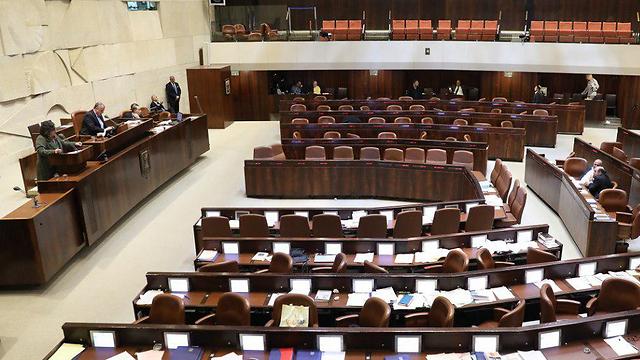

Haredi parties foil efforts to amend supermarkets bill
Contentious bill set to go up to a vote in second and third reading on Tuesday morning after Shas, UTJ stop efforts to remove convenience stores from the legislation's purview; while the coalition thwarted opposition filibuster efforts, it is still struggling to ensure a majority to pass the bill.
The Haredi parties thwarted an attempt on Monday to change the legislation's wording by excluding convenience stores at gas stations and stores in the southern resort city of Eilat from the bill's purview.
Ahead of a vote on the legislation at the Knesset’s Internal Affairs and Environment Committee, coalition and committee chairman MK David Amsalem (Likud) submitted three new reservations to the bill: It would serve as a temporary provision and be limited to five years; it would not apply to free trade areas (specifically the tax-free city of Eilat); and it would not include convenience stores at gas stations.

The committee voted to adopt two of Amsalem's reservations to exclude convenience stores at gas stations and in Eilat from the bill. It then approved the bill for a Knesset vote.
But hours later, the previous version of the legislation—which does include convenience stores under the bill's purview—was approved after objections and pressure from the ulta-Orthodox parties.
The bill will go up to a vote in the Knesset on Tuesday at 9am. Knesset Speaker Yuli Edelstein (Likud) decided to bar a filibuster by the opposition under article 98 of the Knesset's Rules of Procedure, according to which the agenda for the Knesset's discussions is determined in advance, including the exact time of votes. This provision limits the opposition's time at the podium.
No vote offsetting
In a last-ditch effort to postpone the vote on Monday, both the opposition and the Yisrael Beytenu party, which is part of the coalition but opposes the bill, said they will not offset the vote of MK Yehuda Glick (Likud), whose wife Yaffa passed away Monday morning.
Vote offsetting is a common practice in the Israeli parliament, according to which a member of Knesset who cannot attend an important vote reaches an agreement with a lawmaker on the other side of the aisle that they would both not vote.
"I deeply sympathize with MK Glick in his great sorrow over the death of his wife," Opposition Coordinator MK Yoel Hasson (Zionist Union) wrote on Facebook. "But the supermarkets bill is not urgent. We've lived without it for 70 years. There are no offsets, and the coalition can just postpone the vote—it's in their hands."

Knesset Speaker Edelstein was outraged by the opposition's decision. "It is the opposition's right not to offset Yehuda Glick. It is my right to say I know a different kind of behavior. I call on the opposition to take back its insensitive decision for all of our sakes."
Tourism Minister Yariv Levin (Likud) also slammed the opposition's decision, calling it "an unprecedented moral low point."
"In a democracy, the votes in the Knesset should reflect the wish of the voter and not distort the balance of power by showing complete insensitivity and inhumanity in cases when a man is in his grief, or in his sick bed," Levin said.
"The members of the opposition, who speak much of human rights and boast the fact they are apparently the champions of humane behavior on earth, behave as common politicos when announcing they won't offset Minister David Azoulay and MK Glick, after last week they blatantly vilified their friend MK Ilan Gilon who had shown compassion and helped Minister Azoulay. Such a disgrace," Levin added.
Glick, meanwhile, took to Twitter to urge Knesset members not to turn his wife's funeral to a political feud. "I beg and beseech you not to turn my dear wife's funeral into something to fight over. Please, have more love and positive energies," he wrote.
Drumming up a majority
According to the supermarkets bill proposal, a municipality would only be able to allow trade on Saturday, the Jewish day of rest, with the approval of the interior minister.
Interior Minister Aryeh Deri of the ultra-Orthodox Shas party is the one who proposed the legislation in an effort to close down supermarkets and convenience stores that operate on Shabbat.
While the coalition was able to resolve the internal disagreements over the bill's wording by approving a final version that will go up to a vote on Tuesday, and did away with hundreds of opposition reservations by limiting its ability to filibuster the bill, the legislation still faces on crucial problem: difficulty in drumming up a majority to pass it.
Even though the coalition has 66 of the 120 Knesset seats, coalition partner Yisrael Beytenu is expected to vote against the legislation. Yisrael Beytenu Minister Sofa Landver will have to miss the vote, as a minister voting against the coalition's position faces immediate dismissal.
In addition, Minister David Azoulay from Shas will also miss the vote, as he is recovering from surgery, and MK Glick will miss the vote in the wake of his wife's passing.
This leaves the coalition with 59 votes, while the opposition has 58 votes, making it a close call.
Opposition members have been working to convince some coalition MKs to either miss the vote or vote against the bill, including Likud MK Sharren Haskel who opposes the bill and abstained in its first reading; and Kulanu MKs Rachel Azaria and Merav Ben-Ari, who oppose the bill in principle, but it remains unclear how they would vote due to party and coalition allegiance.
Unruly mayor
Haim Bibas, the chairman of the Federation of Local Authorities and mayor of Modi'in, attended the committee meeting and was the center of several confrontations.
During a two-minute break, Yisrael Beytenu MK Yulia Malinovsky criticized Bibas for remaining silent rather than voicing his support to MKs who came out against the legislation.
Bibas responded, "You MKs are disgraceful. You have no idea what you're voting on."
He later also confronted MKs from the ultra-Orthodox Shas party.
Zionist Union MK Merav Michaeli tried to let Bibas speak, but MK Amsalem would not allow it.
Bibas attacked Amsalem in response, saying "You're deciding about my political home here. You're interfering in something central and fundamental to us. You're leading to the desecration of Shabbat, not the observance of Shabbat. Are you going to interfere in my city?"
He was removed from the room as a result.
















